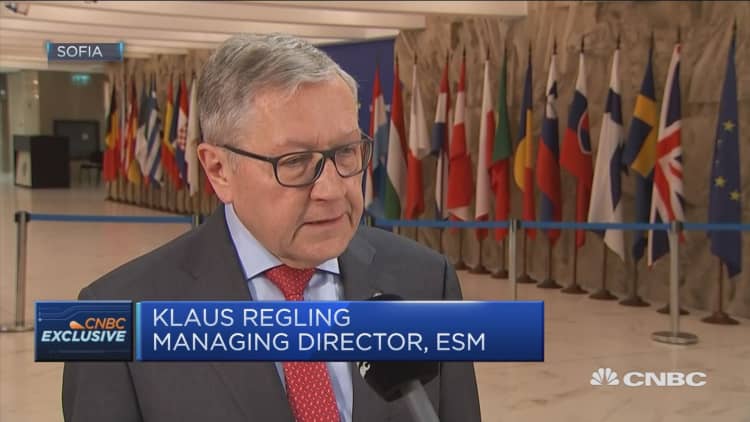
The answer to how Greece will end its third bailout program is linked to how much debt relief it wants, the managing director of the European bailout fund told CNBC.
Greece is due to finish its third bailout about four months from now, and markets have been looking for clues on how that process will play out. Some European and Greek institutions argue that Athens should ask for an additional cash buffer, but the Greek government is against that. Greece wants to be back on its own feet by accessing financial markets to finance itself — a process described as a "clean exit."
Speaking to CNBC on Thursday, Klaus Regling, managing director of the European Stability Mechanism, said that "it doesn't seem necessary" for Greece to request additional money, as long as the government continues reforming.
"Markets are watching [Greece] very carefully, but if they do [continue with reforms] I think Greece can have a clean exit in August and return to the markets," he said.
However, he warned that international institutions, which will continue tracking the progress of the country even after the program ends, could be visiting Athens more often than what's usual in this situation.
European institutions perform monitoring missions twice a year in countries that have ended a program, but for Greece that could be three or four times in one year. The presence of the international creditors is always hard to communicate to the Greek people, who have been under such surveillance since 2010.
"If Greece wants additional debt relief then this surveillance will be enhanced. It will probably be a bit tighter and more comprehensive than what we do in other countries," Regling said.
Nonetheless, Greece and the European creditors still don't know if the International Monetary Fund will be giving money to Athens. The IMF will only agree to disburse some funds once it is satisfied with the debt relief that Europe will provide to Greece — but that's still being decided.
Regling said he recognizes that with only four months to go until the program ends, Europe and the IMF are "running a bit out of time." He stressed the importance of having the IMF fully on board to give credibility to the program, not only to the European electorate but also to the markets.
Market volatility is only in the US
European regulators will soon be publishing the results of stress tests to the Greek banks.
Regling told CNBC that the current concern seen in the markets over higher inflation and higher interest rates is a U.S.-only trend and unlikely to hurt Greek banks.
"In Europe we haven't had volatility," he said. "The situation is quite different."
"I don't see any impact in Greece, for instance," he said, noting that Greek interest rates in the secondary market have been stable.


